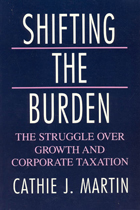
During the past decade, Democrats and Republicans each have received about fifty percent of the votes and controlled about half of the government, but this has not resulted in policy deadlock. Despite highly partisan political posturing, the policy regime has been largely moderate. Incremental, yet substantial, policy innovations such as welfare reform; deficit reduction; the North American Free Trade Agreement; and the deregulation of telecommunications, banking, and agriculture have been accompanied by such continuities as Social Security and Medicare, the maintenance of earlier immigration reforms, and the persistence of many rights-based policies, including federal affirmative action.
In Seeking the Center, twenty-one contributors analyze policy outcomes in light of the frequent alternation in power among evenly divided parties. They show how the triumph of policy moderation and the defeat of more ambitious efforts, such as health care reform, can be explained by mutually supporting economic, intellectual, and political forces. Demonstrating that the determinants of public policy become clear by probing specific issues, rather than in abstract theorizing, they restore the politics of policymaking to the forefront of the political science agenda.
A successor to Martin A. Levin and Marc K. Landy’s influential The New Politics of Public Policy (Johns Hopkins University Press, 1995), this book will be vital reading for advanced undergraduate and graduate students in political science and public policy, as well as a resource for scholars in both fields.

Remarkably accessible and rich in historical evidence, Shifting the Burden is the most compelling explanation to date of how our nation's tax policy is formulated. Cathie J. Martin shows how presidents' cultivation of allies within the business community and struggles within that community itself combine to shape tax policy.

In this wide-ranging assessment of democracy in America today, fifteen respected scholars of American politics chart the strengths and weaknesses of the nation’s democratic mechanisms and outline the challenges that lie ahead. They focus not on specific policies or elections but on the quality of American political life, the representativeness of its governing institutions, and the issues of racial and economic equity.
The contributors cover a broad spectrum of the American political process. Topics include the extent and nature of political participation, the relevance of political parties, political fundraising and its policy consequences, demographic change and its likely effect on the national political agenda, and the future of racial politics. Others explore how representative Congress really is today, how the market economy affects public policy, the use of impeachment as a political weapon, and the degree of corporate influence on the political process. A final chapter explores the circumstances likely to shape policy agendas over the course of the twenty-first century.
Taken together, these essays provide a clear picture of political evolution during the past fifty years and discuss possible problems and issues of the future. Written for advanced undergraduate and graduate students, the book is a thoughtful, well-documented, critical analysis of contemporary American democracy.
READERS
Browse our collection.
PUBLISHERS
See BiblioVault's publisher services.
STUDENT SERVICES
Files for college accessibility offices.
UChicago Accessibility Resources
home | accessibility | search | about | contact us
BiblioVault ® 2001 - 2024
The University of Chicago Press









